Analysis of Vodafone's Operations and Service Management Strategies
VerifiedAdded on 2022/12/09
|12
|3179
|433
Report
AI Summary
This report delves into Vodafone's operations and service management strategies, highlighting key practices like Total Quality Management (TQM) and the application of technology to enhance efficiency. The report explores how Vodafone uses TQM's principles, including customer orientation and continuous improvement, to manage quality and improve customer satisfaction. It also examines the impact of operational management on organizational effectiveness, emphasizing Vodafone's focus on volume, variety, variation, and visibility. Furthermore, the report analyzes the use of technology in production, manufacturing, and design, illustrating how technology minimizes errors, reduces costs, and improves product quality. The report concludes by underscoring the importance of effective operations and service management for Vodafone's success in the telecommunications industry.
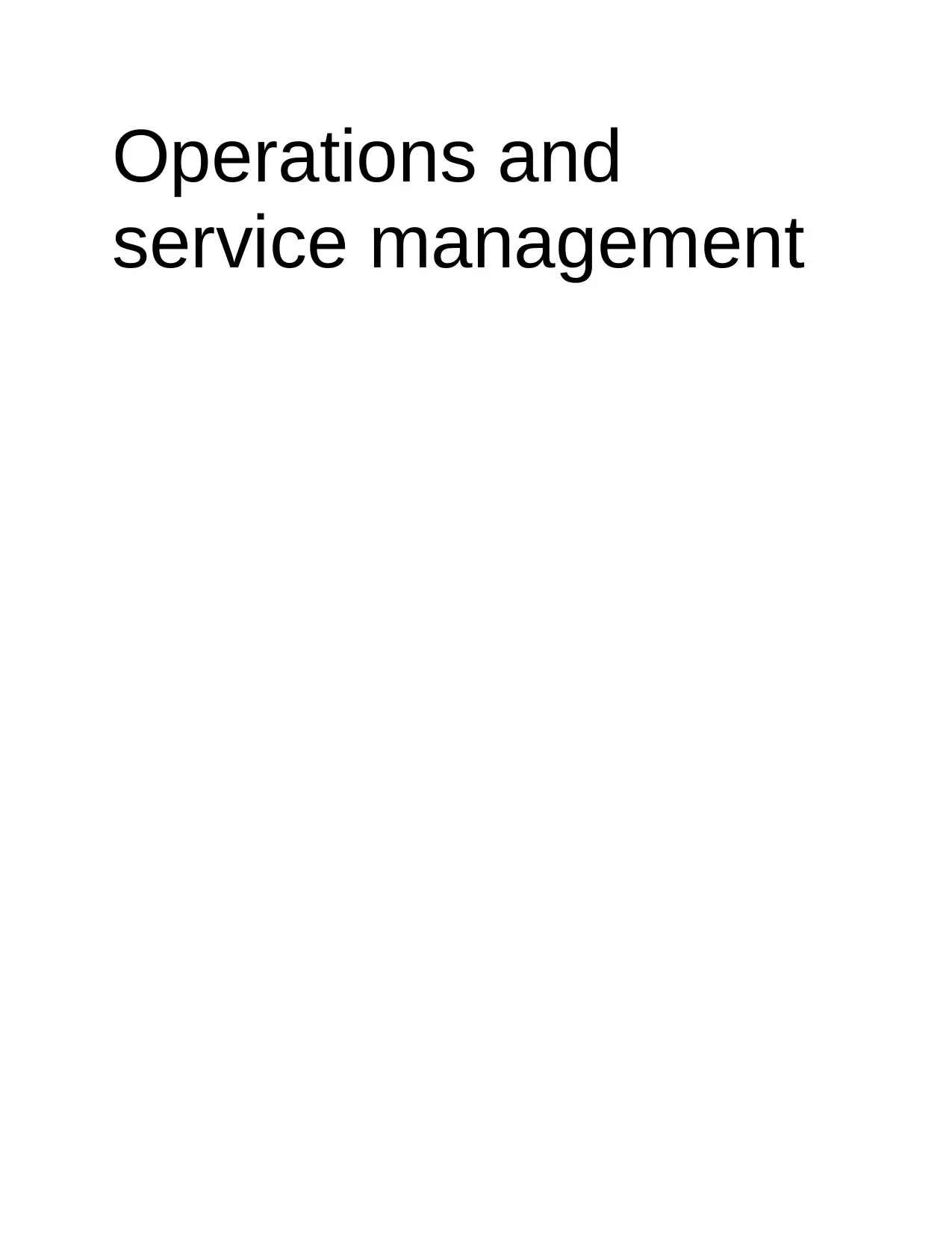
Operations and
service management
service management
Paraphrase This Document
Need a fresh take? Get an instant paraphrase of this document with our AI Paraphraser
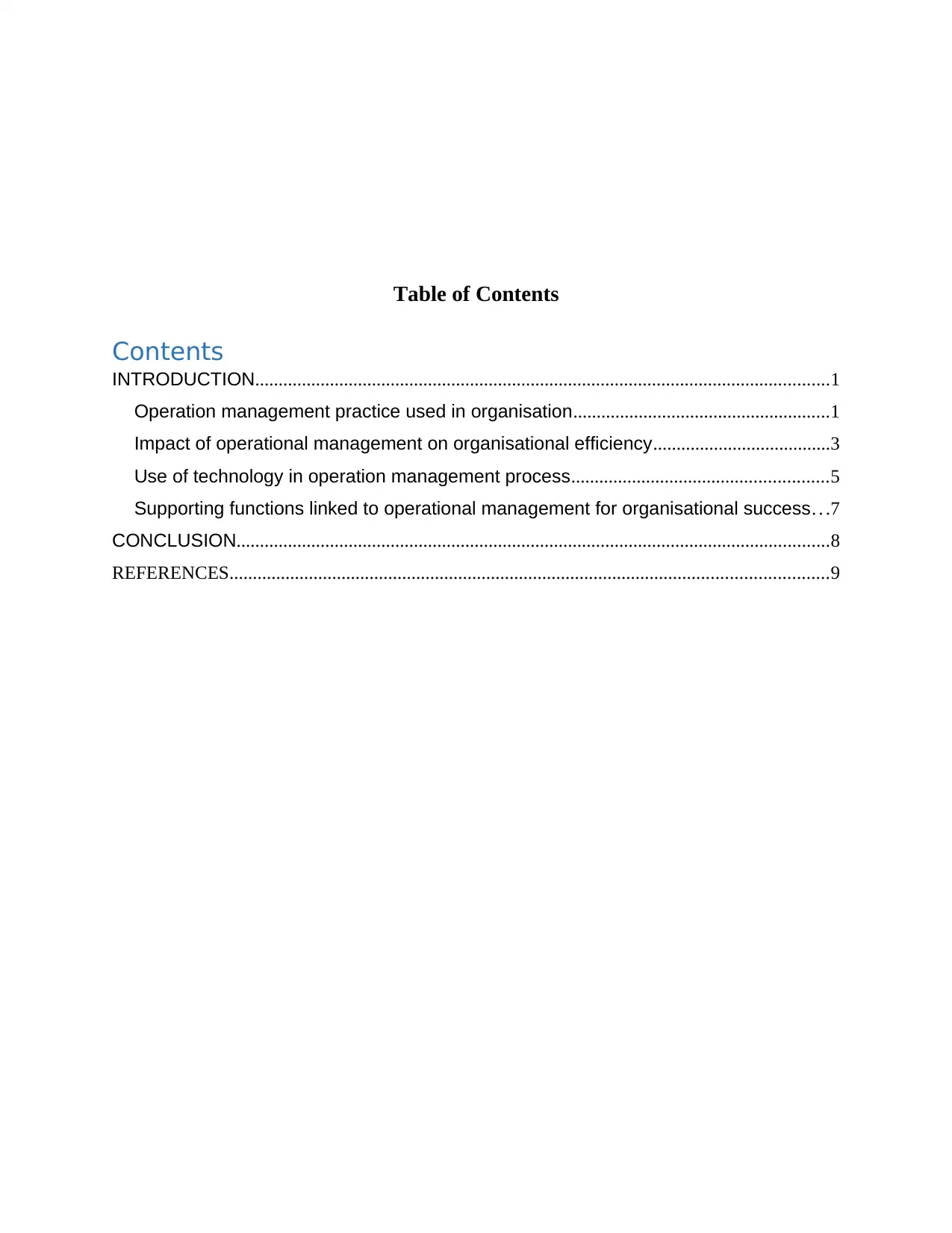
Table of Contents
Contents
INTRODUCTION...........................................................................................................................1
Operation management practice used in organisation.......................................................1
Impact of operational management on organisational efficiency......................................3
Use of technology in operation management process.......................................................5
Supporting functions linked to operational management for organisational success. . .7
CONCLUSION...............................................................................................................................8
REFERENCES................................................................................................................................9
Contents
INTRODUCTION...........................................................................................................................1
Operation management practice used in organisation.......................................................1
Impact of operational management on organisational efficiency......................................3
Use of technology in operation management process.......................................................5
Supporting functions linked to operational management for organisational success. . .7
CONCLUSION...............................................................................................................................8
REFERENCES................................................................................................................................9
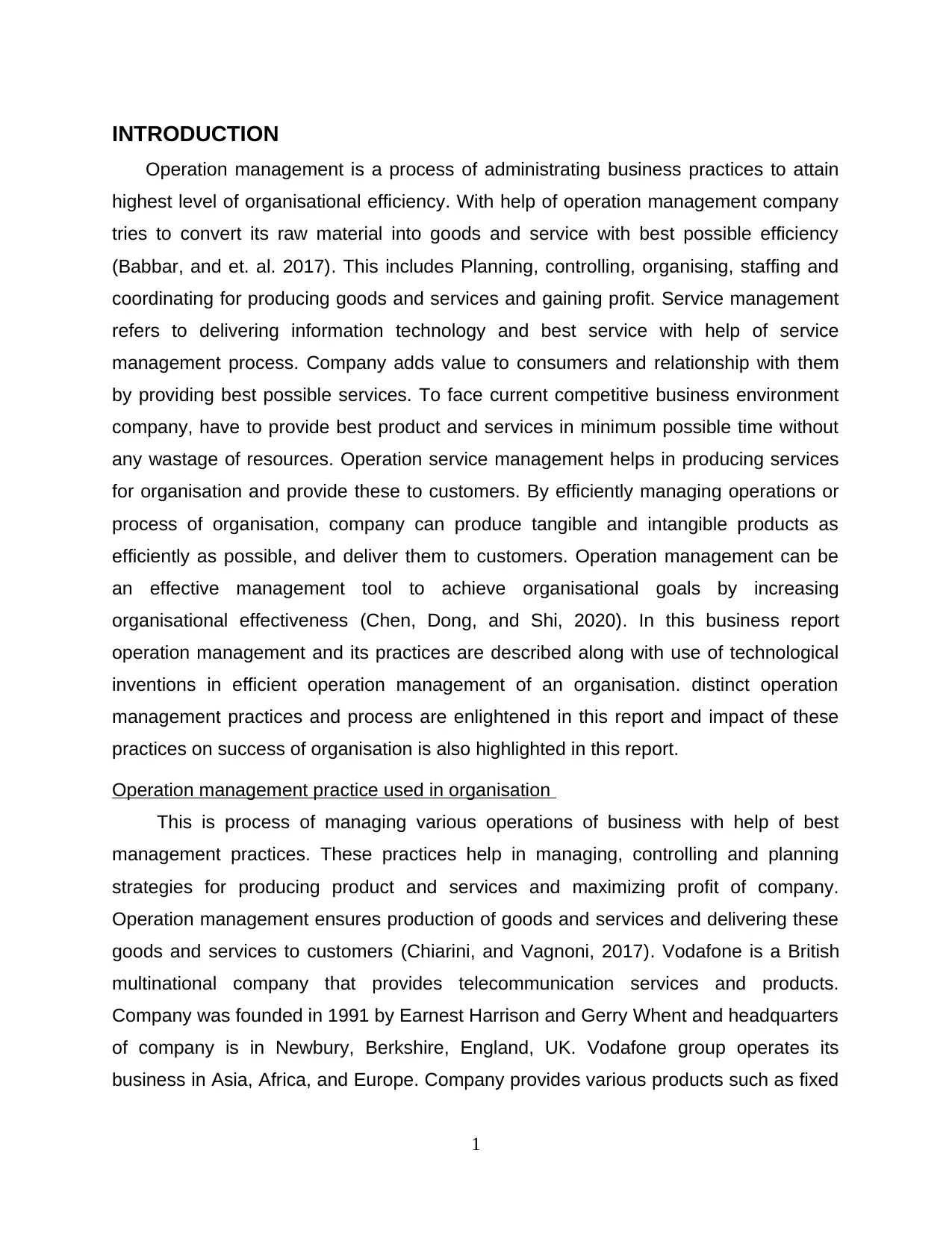
INTRODUCTION
Operation management is a process of administrating business practices to attain
highest level of organisational efficiency. With help of operation management company
tries to convert its raw material into goods and service with best possible efficiency
(Babbar, and et. al. 2017). This includes Planning, controlling, organising, staffing and
coordinating for producing goods and services and gaining profit. Service management
refers to delivering information technology and best service with help of service
management process. Company adds value to consumers and relationship with them
by providing best possible services. To face current competitive business environment
company, have to provide best product and services in minimum possible time without
any wastage of resources. Operation service management helps in producing services
for organisation and provide these to customers. By efficiently managing operations or
process of organisation, company can produce tangible and intangible products as
efficiently as possible, and deliver them to customers. Operation management can be
an effective management tool to achieve organisational goals by increasing
organisational effectiveness (Chen, Dong, and Shi, 2020). In this business report
operation management and its practices are described along with use of technological
inventions in efficient operation management of an organisation. distinct operation
management practices and process are enlightened in this report and impact of these
practices on success of organisation is also highlighted in this report.
Operation management practice used in organisation
This is process of managing various operations of business with help of best
management practices. These practices help in managing, controlling and planning
strategies for producing product and services and maximizing profit of company.
Operation management ensures production of goods and services and delivering these
goods and services to customers (Chiarini, and Vagnoni, 2017). Vodafone is a British
multinational company that provides telecommunication services and products.
Company was founded in 1991 by Earnest Harrison and Gerry Whent and headquarters
of company is in Newbury, Berkshire, England, UK. Vodafone group operates its
business in Asia, Africa, and Europe. Company provides various products such as fixed
1
Operation management is a process of administrating business practices to attain
highest level of organisational efficiency. With help of operation management company
tries to convert its raw material into goods and service with best possible efficiency
(Babbar, and et. al. 2017). This includes Planning, controlling, organising, staffing and
coordinating for producing goods and services and gaining profit. Service management
refers to delivering information technology and best service with help of service
management process. Company adds value to consumers and relationship with them
by providing best possible services. To face current competitive business environment
company, have to provide best product and services in minimum possible time without
any wastage of resources. Operation service management helps in producing services
for organisation and provide these to customers. By efficiently managing operations or
process of organisation, company can produce tangible and intangible products as
efficiently as possible, and deliver them to customers. Operation management can be
an effective management tool to achieve organisational goals by increasing
organisational effectiveness (Chen, Dong, and Shi, 2020). In this business report
operation management and its practices are described along with use of technological
inventions in efficient operation management of an organisation. distinct operation
management practices and process are enlightened in this report and impact of these
practices on success of organisation is also highlighted in this report.
Operation management practice used in organisation
This is process of managing various operations of business with help of best
management practices. These practices help in managing, controlling and planning
strategies for producing product and services and maximizing profit of company.
Operation management ensures production of goods and services and delivering these
goods and services to customers (Chiarini, and Vagnoni, 2017). Vodafone is a British
multinational company that provides telecommunication services and products.
Company was founded in 1991 by Earnest Harrison and Gerry Whent and headquarters
of company is in Newbury, Berkshire, England, UK. Vodafone group operates its
business in Asia, Africa, and Europe. Company provides various products such as fixed
1
⊘ This is a preview!⊘
Do you want full access?
Subscribe today to unlock all pages.

Trusted by 1+ million students worldwide
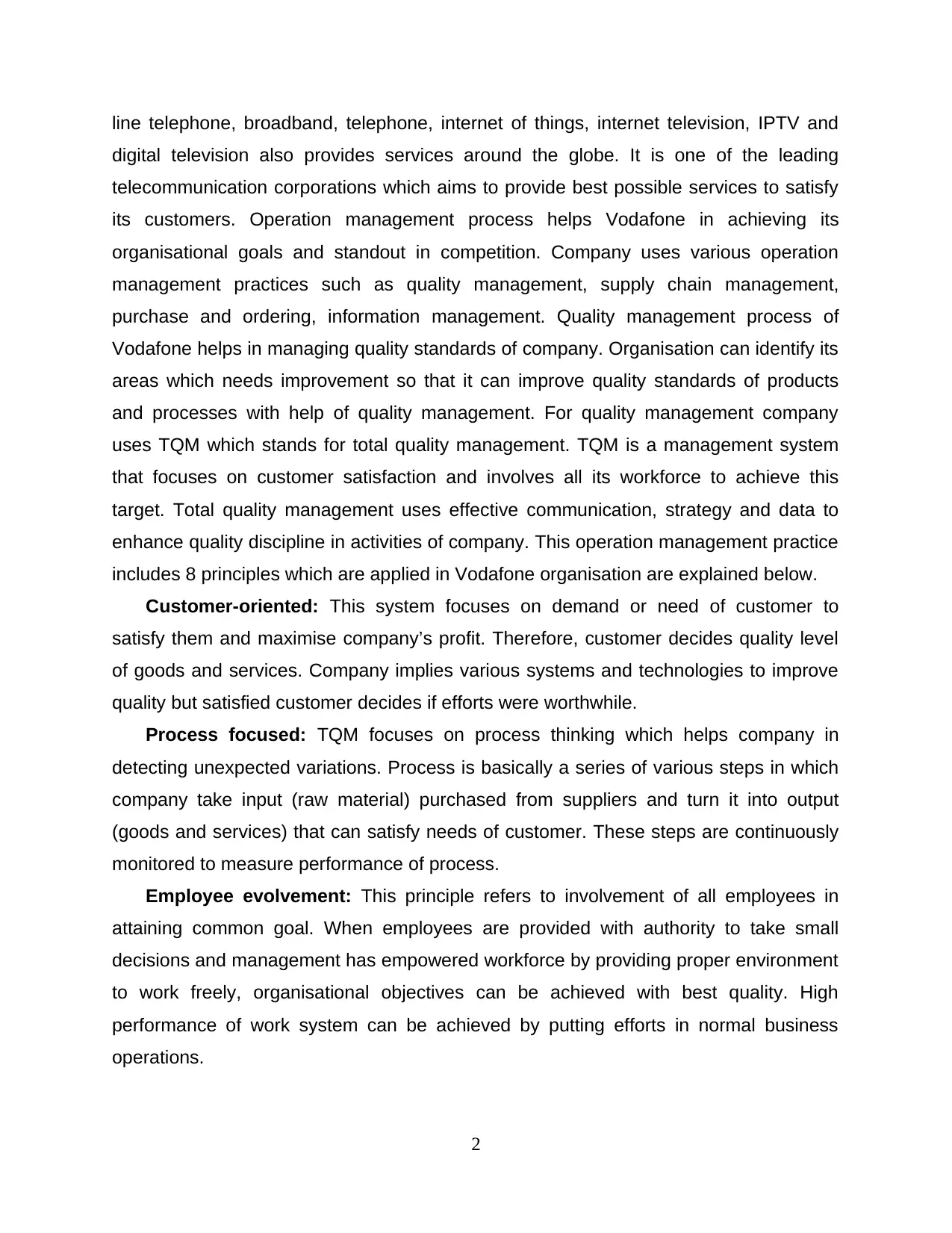
line telephone, broadband, telephone, internet of things, internet television, IPTV and
digital television also provides services around the globe. It is one of the leading
telecommunication corporations which aims to provide best possible services to satisfy
its customers. Operation management process helps Vodafone in achieving its
organisational goals and standout in competition. Company uses various operation
management practices such as quality management, supply chain management,
purchase and ordering, information management. Quality management process of
Vodafone helps in managing quality standards of company. Organisation can identify its
areas which needs improvement so that it can improve quality standards of products
and processes with help of quality management. For quality management company
uses TQM which stands for total quality management. TQM is a management system
that focuses on customer satisfaction and involves all its workforce to achieve this
target. Total quality management uses effective communication, strategy and data to
enhance quality discipline in activities of company. This operation management practice
includes 8 principles which are applied in Vodafone organisation are explained below.
Customer-oriented: This system focuses on demand or need of customer to
satisfy them and maximise company’s profit. Therefore, customer decides quality level
of goods and services. Company implies various systems and technologies to improve
quality but satisfied customer decides if efforts were worthwhile.
Process focused: TQM focuses on process thinking which helps company in
detecting unexpected variations. Process is basically a series of various steps in which
company take input (raw material) purchased from suppliers and turn it into output
(goods and services) that can satisfy needs of customer. These steps are continuously
monitored to measure performance of process.
Employee evolvement: This principle refers to involvement of all employees in
attaining common goal. When employees are provided with authority to take small
decisions and management has empowered workforce by providing proper environment
to work freely, organisational objectives can be achieved with best quality. High
performance of work system can be achieved by putting efforts in normal business
operations.
2
digital television also provides services around the globe. It is one of the leading
telecommunication corporations which aims to provide best possible services to satisfy
its customers. Operation management process helps Vodafone in achieving its
organisational goals and standout in competition. Company uses various operation
management practices such as quality management, supply chain management,
purchase and ordering, information management. Quality management process of
Vodafone helps in managing quality standards of company. Organisation can identify its
areas which needs improvement so that it can improve quality standards of products
and processes with help of quality management. For quality management company
uses TQM which stands for total quality management. TQM is a management system
that focuses on customer satisfaction and involves all its workforce to achieve this
target. Total quality management uses effective communication, strategy and data to
enhance quality discipline in activities of company. This operation management practice
includes 8 principles which are applied in Vodafone organisation are explained below.
Customer-oriented: This system focuses on demand or need of customer to
satisfy them and maximise company’s profit. Therefore, customer decides quality level
of goods and services. Company implies various systems and technologies to improve
quality but satisfied customer decides if efforts were worthwhile.
Process focused: TQM focuses on process thinking which helps company in
detecting unexpected variations. Process is basically a series of various steps in which
company take input (raw material) purchased from suppliers and turn it into output
(goods and services) that can satisfy needs of customer. These steps are continuously
monitored to measure performance of process.
Employee evolvement: This principle refers to involvement of all employees in
attaining common goal. When employees are provided with authority to take small
decisions and management has empowered workforce by providing proper environment
to work freely, organisational objectives can be achieved with best quality. High
performance of work system can be achieved by putting efforts in normal business
operations.
2
Paraphrase This Document
Need a fresh take? Get an instant paraphrase of this document with our AI Paraphraser
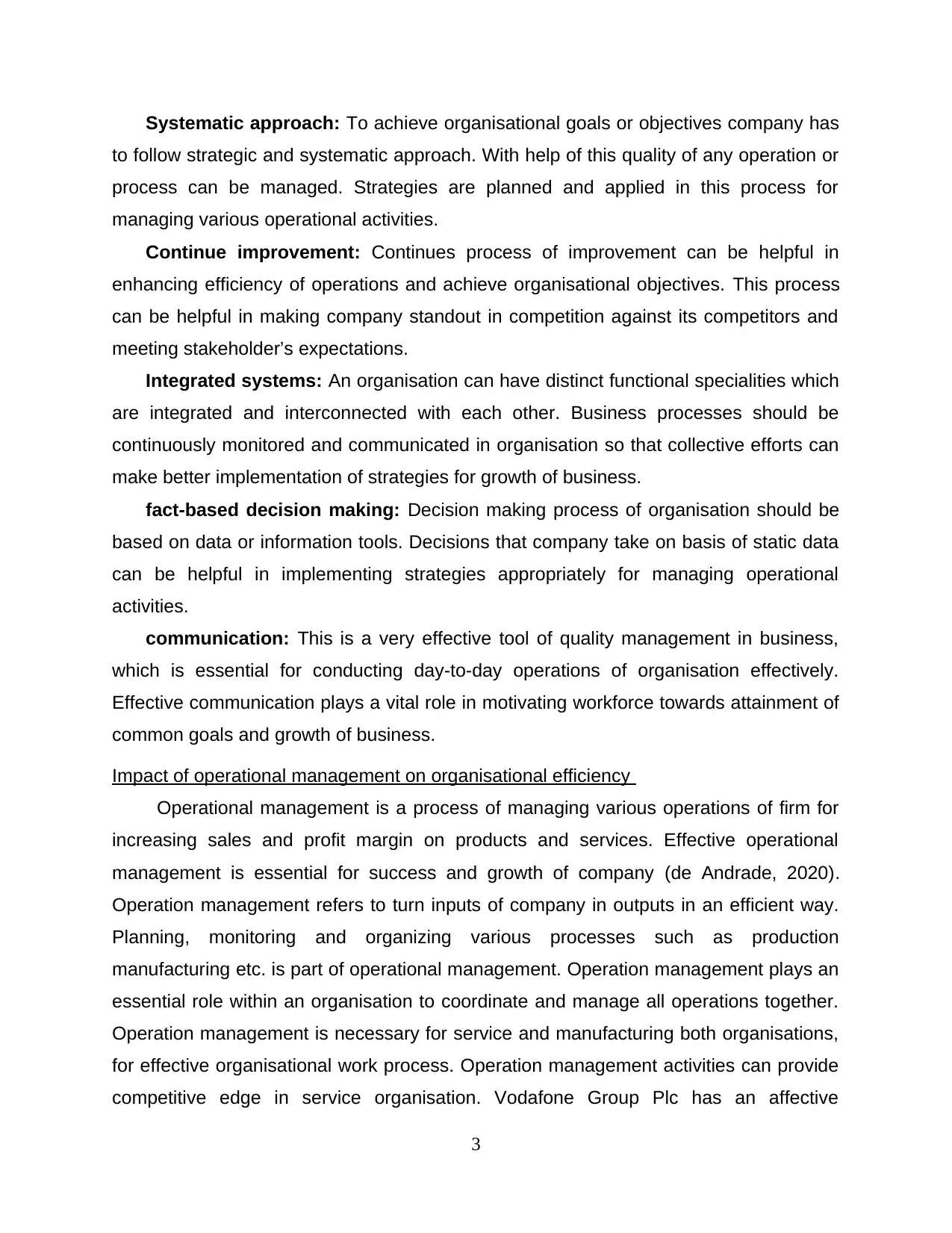
Systematic approach: To achieve organisational goals or objectives company has
to follow strategic and systematic approach. With help of this quality of any operation or
process can be managed. Strategies are planned and applied in this process for
managing various operational activities.
Continue improvement: Continues process of improvement can be helpful in
enhancing efficiency of operations and achieve organisational objectives. This process
can be helpful in making company standout in competition against its competitors and
meeting stakeholder’s expectations.
Integrated systems: An organisation can have distinct functional specialities which
are integrated and interconnected with each other. Business processes should be
continuously monitored and communicated in organisation so that collective efforts can
make better implementation of strategies for growth of business.
fact-based decision making: Decision making process of organisation should be
based on data or information tools. Decisions that company take on basis of static data
can be helpful in implementing strategies appropriately for managing operational
activities.
communication: This is a very effective tool of quality management in business,
which is essential for conducting day-to-day operations of organisation effectively.
Effective communication plays a vital role in motivating workforce towards attainment of
common goals and growth of business.
Impact of operational management on organisational efficiency
Operational management is a process of managing various operations of firm for
increasing sales and profit margin on products and services. Effective operational
management is essential for success and growth of company (de Andrade, 2020).
Operation management refers to turn inputs of company in outputs in an efficient way.
Planning, monitoring and organizing various processes such as production
manufacturing etc. is part of operational management. Operation management plays an
essential role within an organisation to coordinate and manage all operations together.
Operation management is necessary for service and manufacturing both organisations,
for effective organisational work process. Operation management activities can provide
competitive edge in service organisation. Vodafone Group Plc has an affective
3
to follow strategic and systematic approach. With help of this quality of any operation or
process can be managed. Strategies are planned and applied in this process for
managing various operational activities.
Continue improvement: Continues process of improvement can be helpful in
enhancing efficiency of operations and achieve organisational objectives. This process
can be helpful in making company standout in competition against its competitors and
meeting stakeholder’s expectations.
Integrated systems: An organisation can have distinct functional specialities which
are integrated and interconnected with each other. Business processes should be
continuously monitored and communicated in organisation so that collective efforts can
make better implementation of strategies for growth of business.
fact-based decision making: Decision making process of organisation should be
based on data or information tools. Decisions that company take on basis of static data
can be helpful in implementing strategies appropriately for managing operational
activities.
communication: This is a very effective tool of quality management in business,
which is essential for conducting day-to-day operations of organisation effectively.
Effective communication plays a vital role in motivating workforce towards attainment of
common goals and growth of business.
Impact of operational management on organisational efficiency
Operational management is a process of managing various operations of firm for
increasing sales and profit margin on products and services. Effective operational
management is essential for success and growth of company (de Andrade, 2020).
Operation management refers to turn inputs of company in outputs in an efficient way.
Planning, monitoring and organizing various processes such as production
manufacturing etc. is part of operational management. Operation management plays an
essential role within an organisation to coordinate and manage all operations together.
Operation management is necessary for service and manufacturing both organisations,
for effective organisational work process. Operation management activities can provide
competitive edge in service organisation. Vodafone Group Plc has an affective
3
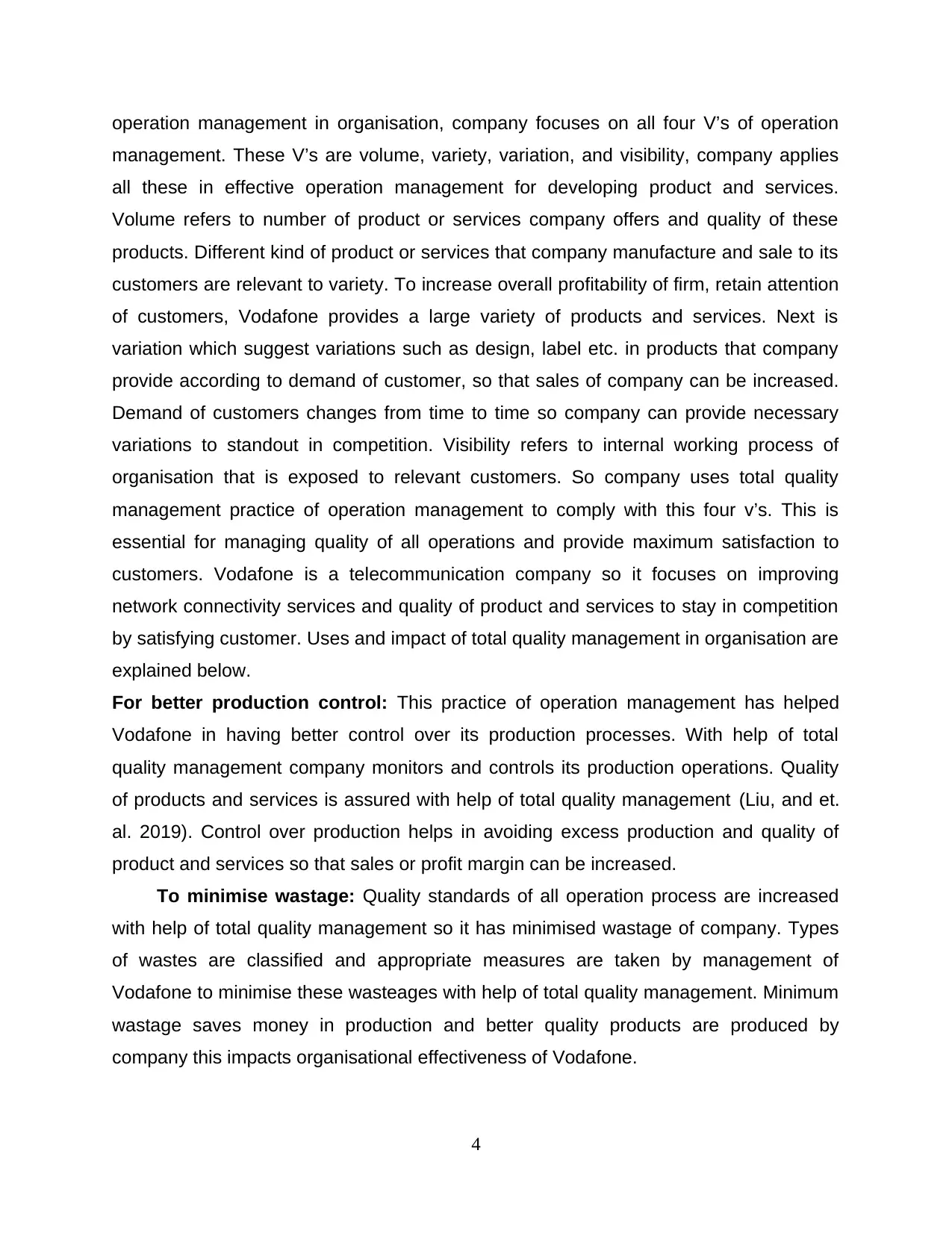
operation management in organisation, company focuses on all four V’s of operation
management. These V’s are volume, variety, variation, and visibility, company applies
all these in effective operation management for developing product and services.
Volume refers to number of product or services company offers and quality of these
products. Different kind of product or services that company manufacture and sale to its
customers are relevant to variety. To increase overall profitability of firm, retain attention
of customers, Vodafone provides a large variety of products and services. Next is
variation which suggest variations such as design, label etc. in products that company
provide according to demand of customer, so that sales of company can be increased.
Demand of customers changes from time to time so company can provide necessary
variations to standout in competition. Visibility refers to internal working process of
organisation that is exposed to relevant customers. So company uses total quality
management practice of operation management to comply with this four v’s. This is
essential for managing quality of all operations and provide maximum satisfaction to
customers. Vodafone is a telecommunication company so it focuses on improving
network connectivity services and quality of product and services to stay in competition
by satisfying customer. Uses and impact of total quality management in organisation are
explained below.
For better production control: This practice of operation management has helped
Vodafone in having better control over its production processes. With help of total
quality management company monitors and controls its production operations. Quality
of products and services is assured with help of total quality management (Liu, and et.
al. 2019). Control over production helps in avoiding excess production and quality of
product and services so that sales or profit margin can be increased.
To minimise wastage: Quality standards of all operation process are increased
with help of total quality management so it has minimised wastage of company. Types
of wastes are classified and appropriate measures are taken by management of
Vodafone to minimise these wasteages with help of total quality management. Minimum
wastage saves money in production and better quality products are produced by
company this impacts organisational effectiveness of Vodafone.
4
management. These V’s are volume, variety, variation, and visibility, company applies
all these in effective operation management for developing product and services.
Volume refers to number of product or services company offers and quality of these
products. Different kind of product or services that company manufacture and sale to its
customers are relevant to variety. To increase overall profitability of firm, retain attention
of customers, Vodafone provides a large variety of products and services. Next is
variation which suggest variations such as design, label etc. in products that company
provide according to demand of customer, so that sales of company can be increased.
Demand of customers changes from time to time so company can provide necessary
variations to standout in competition. Visibility refers to internal working process of
organisation that is exposed to relevant customers. So company uses total quality
management practice of operation management to comply with this four v’s. This is
essential for managing quality of all operations and provide maximum satisfaction to
customers. Vodafone is a telecommunication company so it focuses on improving
network connectivity services and quality of product and services to stay in competition
by satisfying customer. Uses and impact of total quality management in organisation are
explained below.
For better production control: This practice of operation management has helped
Vodafone in having better control over its production processes. With help of total
quality management company monitors and controls its production operations. Quality
of products and services is assured with help of total quality management (Liu, and et.
al. 2019). Control over production helps in avoiding excess production and quality of
product and services so that sales or profit margin can be increased.
To minimise wastage: Quality standards of all operation process are increased
with help of total quality management so it has minimised wastage of company. Types
of wastes are classified and appropriate measures are taken by management of
Vodafone to minimise these wasteages with help of total quality management. Minimum
wastage saves money in production and better quality products are produced by
company this impacts organisational effectiveness of Vodafone.
4
⊘ This is a preview!⊘
Do you want full access?
Subscribe today to unlock all pages.

Trusted by 1+ million students worldwide
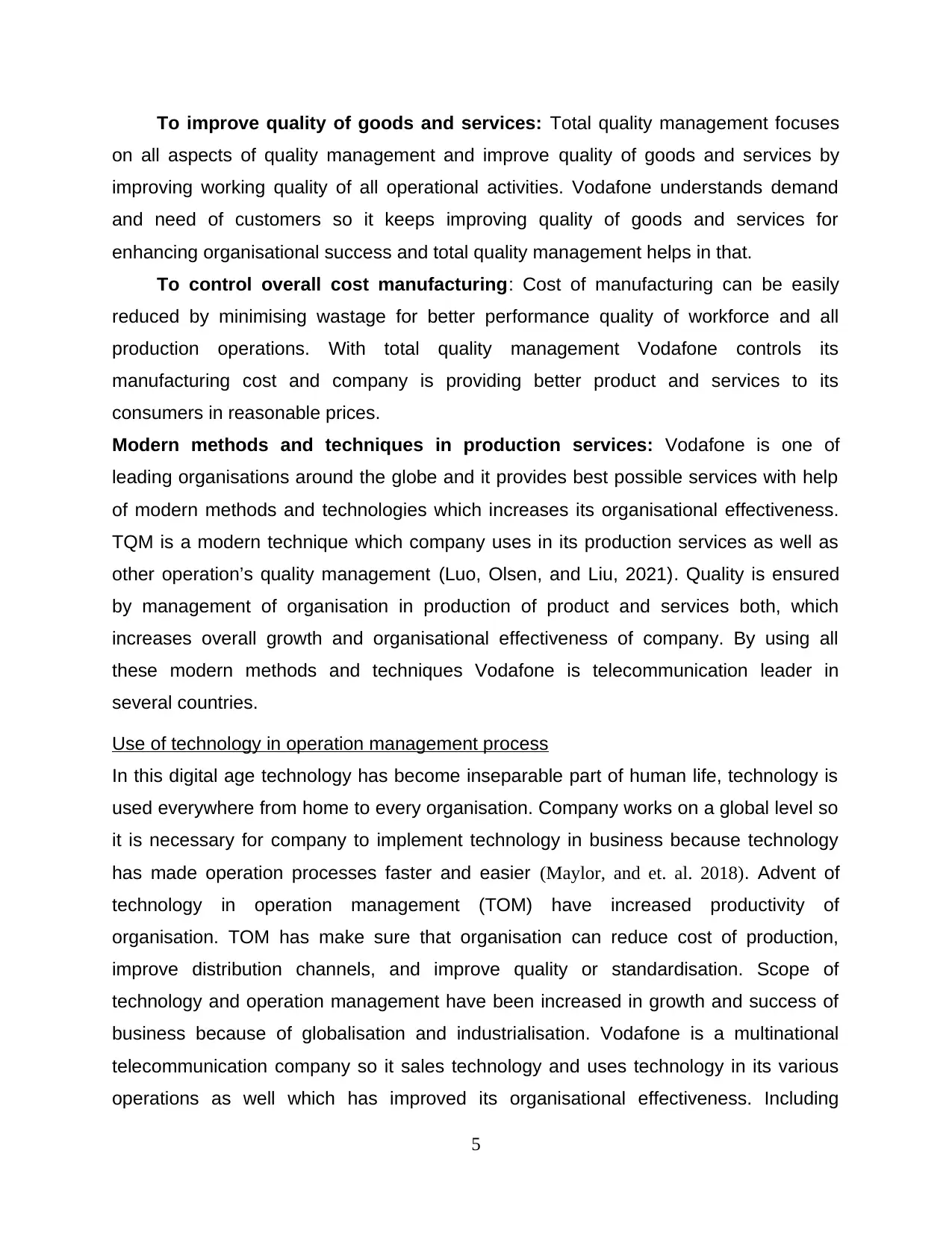
To improve quality of goods and services: Total quality management focuses
on all aspects of quality management and improve quality of goods and services by
improving working quality of all operational activities. Vodafone understands demand
and need of customers so it keeps improving quality of goods and services for
enhancing organisational success and total quality management helps in that.
To control overall cost manufacturing: Cost of manufacturing can be easily
reduced by minimising wastage for better performance quality of workforce and all
production operations. With total quality management Vodafone controls its
manufacturing cost and company is providing better product and services to its
consumers in reasonable prices.
Modern methods and techniques in production services: Vodafone is one of
leading organisations around the globe and it provides best possible services with help
of modern methods and technologies which increases its organisational effectiveness.
TQM is a modern technique which company uses in its production services as well as
other operation’s quality management (Luo, Olsen, and Liu, 2021). Quality is ensured
by management of organisation in production of product and services both, which
increases overall growth and organisational effectiveness of company. By using all
these modern methods and techniques Vodafone is telecommunication leader in
several countries.
Use of technology in operation management process
In this digital age technology has become inseparable part of human life, technology is
used everywhere from home to every organisation. Company works on a global level so
it is necessary for company to implement technology in business because technology
has made operation processes faster and easier (Maylor, and et. al. 2018). Advent of
technology in operation management (TOM) have increased productivity of
organisation. TOM has make sure that organisation can reduce cost of production,
improve distribution channels, and improve quality or standardisation. Scope of
technology and operation management have been increased in growth and success of
business because of globalisation and industrialisation. Vodafone is a multinational
telecommunication company so it sales technology and uses technology in its various
operations as well which has improved its organisational effectiveness. Including
5
on all aspects of quality management and improve quality of goods and services by
improving working quality of all operational activities. Vodafone understands demand
and need of customers so it keeps improving quality of goods and services for
enhancing organisational success and total quality management helps in that.
To control overall cost manufacturing: Cost of manufacturing can be easily
reduced by minimising wastage for better performance quality of workforce and all
production operations. With total quality management Vodafone controls its
manufacturing cost and company is providing better product and services to its
consumers in reasonable prices.
Modern methods and techniques in production services: Vodafone is one of
leading organisations around the globe and it provides best possible services with help
of modern methods and technologies which increases its organisational effectiveness.
TQM is a modern technique which company uses in its production services as well as
other operation’s quality management (Luo, Olsen, and Liu, 2021). Quality is ensured
by management of organisation in production of product and services both, which
increases overall growth and organisational effectiveness of company. By using all
these modern methods and techniques Vodafone is telecommunication leader in
several countries.
Use of technology in operation management process
In this digital age technology has become inseparable part of human life, technology is
used everywhere from home to every organisation. Company works on a global level so
it is necessary for company to implement technology in business because technology
has made operation processes faster and easier (Maylor, and et. al. 2018). Advent of
technology in operation management (TOM) have increased productivity of
organisation. TOM has make sure that organisation can reduce cost of production,
improve distribution channels, and improve quality or standardisation. Scope of
technology and operation management have been increased in growth and success of
business because of globalisation and industrialisation. Vodafone is a multinational
telecommunication company so it sales technology and uses technology in its various
operations as well which has improved its organisational effectiveness. Including
5
Paraphrase This Document
Need a fresh take? Get an instant paraphrase of this document with our AI Paraphraser
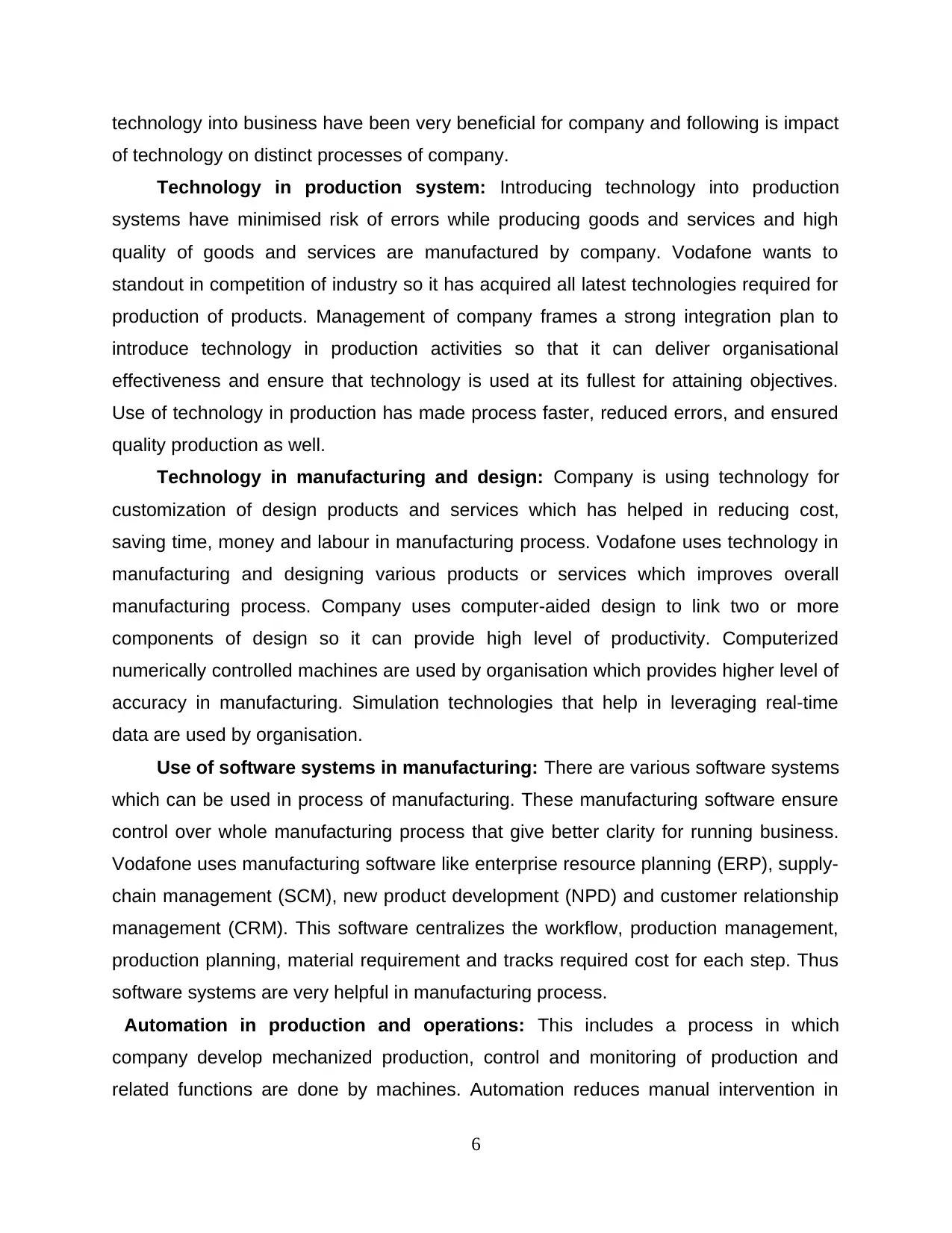
technology into business have been very beneficial for company and following is impact
of technology on distinct processes of company.
Technology in production system: Introducing technology into production
systems have minimised risk of errors while producing goods and services and high
quality of goods and services are manufactured by company. Vodafone wants to
standout in competition of industry so it has acquired all latest technologies required for
production of products. Management of company frames a strong integration plan to
introduce technology in production activities so that it can deliver organisational
effectiveness and ensure that technology is used at its fullest for attaining objectives.
Use of technology in production has made process faster, reduced errors, and ensured
quality production as well.
Technology in manufacturing and design: Company is using technology for
customization of design products and services which has helped in reducing cost,
saving time, money and labour in manufacturing process. Vodafone uses technology in
manufacturing and designing various products or services which improves overall
manufacturing process. Company uses computer-aided design to link two or more
components of design so it can provide high level of productivity. Computerized
numerically controlled machines are used by organisation which provides higher level of
accuracy in manufacturing. Simulation technologies that help in leveraging real-time
data are used by organisation.
Use of software systems in manufacturing: There are various software systems
which can be used in process of manufacturing. These manufacturing software ensure
control over whole manufacturing process that give better clarity for running business.
Vodafone uses manufacturing software like enterprise resource planning (ERP), supply-
chain management (SCM), new product development (NPD) and customer relationship
management (CRM). This software centralizes the workflow, production management,
production planning, material requirement and tracks required cost for each step. Thus
software systems are very helpful in manufacturing process.
Automation in production and operations: This includes a process in which
company develop mechanized production, control and monitoring of production and
related functions are done by machines. Automation reduces manual intervention in
6
of technology on distinct processes of company.
Technology in production system: Introducing technology into production
systems have minimised risk of errors while producing goods and services and high
quality of goods and services are manufactured by company. Vodafone wants to
standout in competition of industry so it has acquired all latest technologies required for
production of products. Management of company frames a strong integration plan to
introduce technology in production activities so that it can deliver organisational
effectiveness and ensure that technology is used at its fullest for attaining objectives.
Use of technology in production has made process faster, reduced errors, and ensured
quality production as well.
Technology in manufacturing and design: Company is using technology for
customization of design products and services which has helped in reducing cost,
saving time, money and labour in manufacturing process. Vodafone uses technology in
manufacturing and designing various products or services which improves overall
manufacturing process. Company uses computer-aided design to link two or more
components of design so it can provide high level of productivity. Computerized
numerically controlled machines are used by organisation which provides higher level of
accuracy in manufacturing. Simulation technologies that help in leveraging real-time
data are used by organisation.
Use of software systems in manufacturing: There are various software systems
which can be used in process of manufacturing. These manufacturing software ensure
control over whole manufacturing process that give better clarity for running business.
Vodafone uses manufacturing software like enterprise resource planning (ERP), supply-
chain management (SCM), new product development (NPD) and customer relationship
management (CRM). This software centralizes the workflow, production management,
production planning, material requirement and tracks required cost for each step. Thus
software systems are very helpful in manufacturing process.
Automation in production and operations: This includes a process in which
company develop mechanized production, control and monitoring of production and
related functions are done by machines. Automation reduces manual intervention in
6
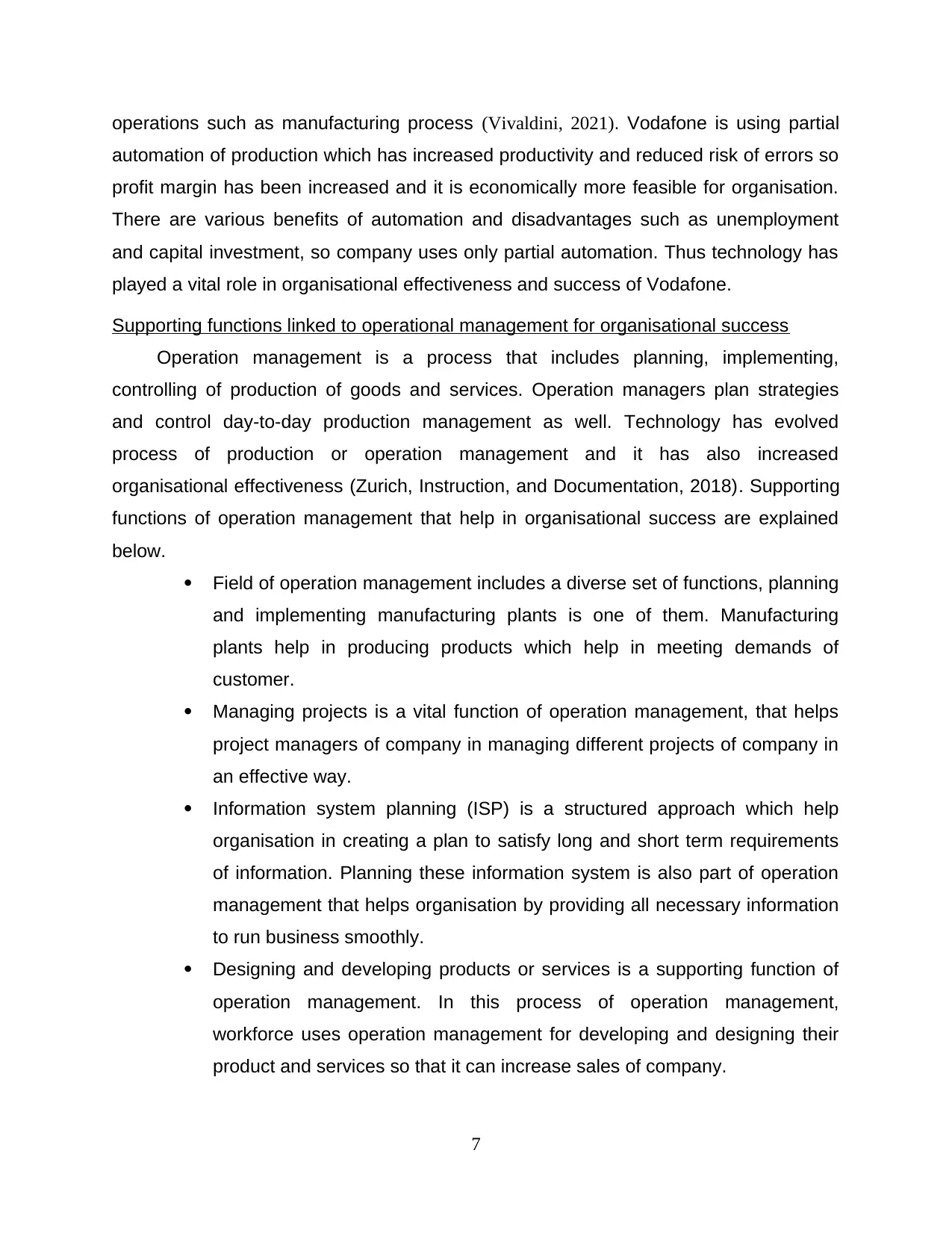
operations such as manufacturing process (Vivaldini, 2021). Vodafone is using partial
automation of production which has increased productivity and reduced risk of errors so
profit margin has been increased and it is economically more feasible for organisation.
There are various benefits of automation and disadvantages such as unemployment
and capital investment, so company uses only partial automation. Thus technology has
played a vital role in organisational effectiveness and success of Vodafone.
Supporting functions linked to operational management for organisational success
Operation management is a process that includes planning, implementing,
controlling of production of goods and services. Operation managers plan strategies
and control day-to-day production management as well. Technology has evolved
process of production or operation management and it has also increased
organisational effectiveness (Zurich, Instruction, and Documentation, 2018). Supporting
functions of operation management that help in organisational success are explained
below.
Field of operation management includes a diverse set of functions, planning
and implementing manufacturing plants is one of them. Manufacturing
plants help in producing products which help in meeting demands of
customer.
Managing projects is a vital function of operation management, that helps
project managers of company in managing different projects of company in
an effective way.
Information system planning (ISP) is a structured approach which help
organisation in creating a plan to satisfy long and short term requirements
of information. Planning these information system is also part of operation
management that helps organisation by providing all necessary information
to run business smoothly.
Designing and developing products or services is a supporting function of
operation management. In this process of operation management,
workforce uses operation management for developing and designing their
product and services so that it can increase sales of company.
7
automation of production which has increased productivity and reduced risk of errors so
profit margin has been increased and it is economically more feasible for organisation.
There are various benefits of automation and disadvantages such as unemployment
and capital investment, so company uses only partial automation. Thus technology has
played a vital role in organisational effectiveness and success of Vodafone.
Supporting functions linked to operational management for organisational success
Operation management is a process that includes planning, implementing,
controlling of production of goods and services. Operation managers plan strategies
and control day-to-day production management as well. Technology has evolved
process of production or operation management and it has also increased
organisational effectiveness (Zurich, Instruction, and Documentation, 2018). Supporting
functions of operation management that help in organisational success are explained
below.
Field of operation management includes a diverse set of functions, planning
and implementing manufacturing plants is one of them. Manufacturing
plants help in producing products which help in meeting demands of
customer.
Managing projects is a vital function of operation management, that helps
project managers of company in managing different projects of company in
an effective way.
Information system planning (ISP) is a structured approach which help
organisation in creating a plan to satisfy long and short term requirements
of information. Planning these information system is also part of operation
management that helps organisation by providing all necessary information
to run business smoothly.
Designing and developing products or services is a supporting function of
operation management. In this process of operation management,
workforce uses operation management for developing and designing their
product and services so that it can increase sales of company.
7
⊘ This is a preview!⊘
Do you want full access?
Subscribe today to unlock all pages.

Trusted by 1+ million students worldwide
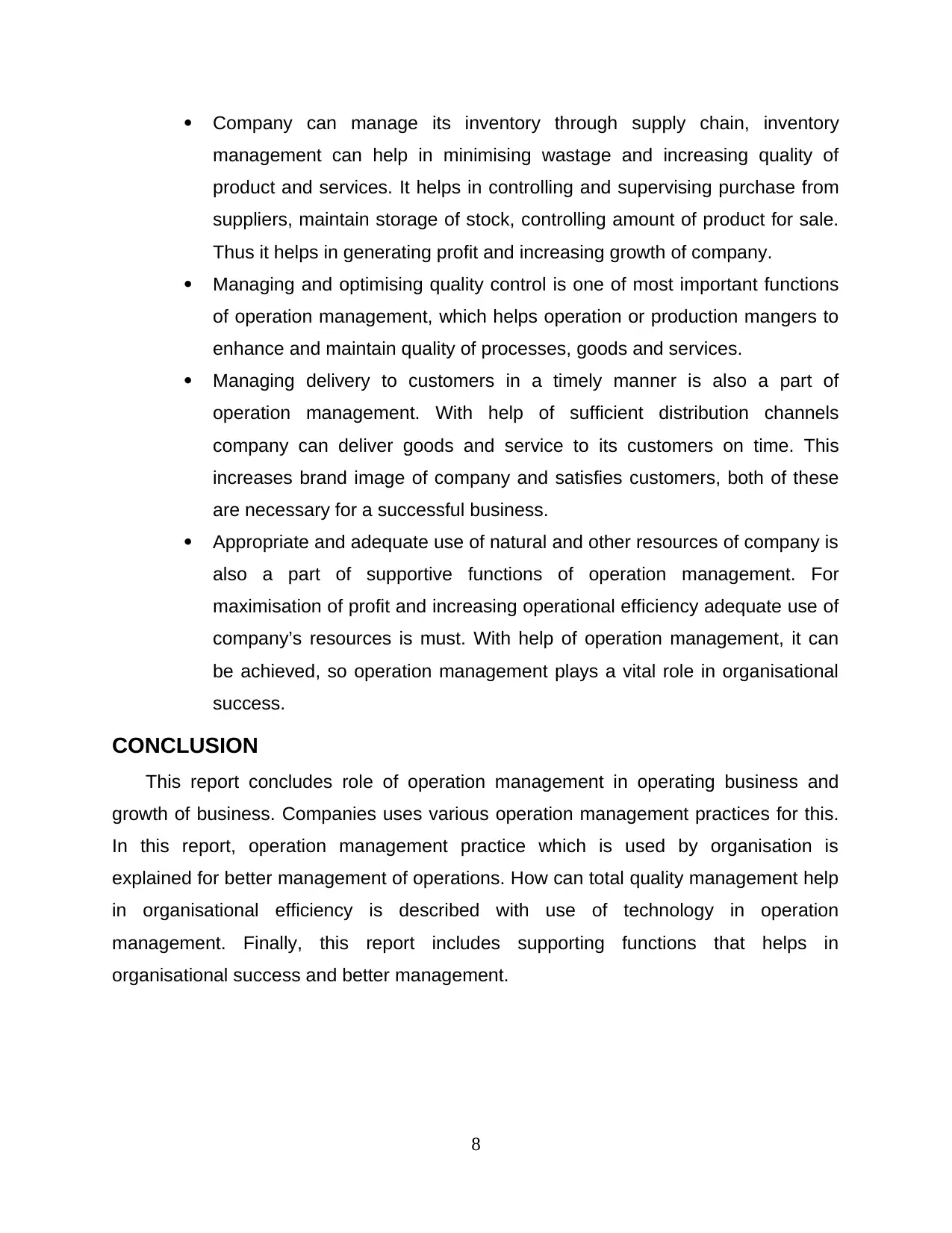
Company can manage its inventory through supply chain, inventory
management can help in minimising wastage and increasing quality of
product and services. It helps in controlling and supervising purchase from
suppliers, maintain storage of stock, controlling amount of product for sale.
Thus it helps in generating profit and increasing growth of company.
Managing and optimising quality control is one of most important functions
of operation management, which helps operation or production mangers to
enhance and maintain quality of processes, goods and services.
Managing delivery to customers in a timely manner is also a part of
operation management. With help of sufficient distribution channels
company can deliver goods and service to its customers on time. This
increases brand image of company and satisfies customers, both of these
are necessary for a successful business.
Appropriate and adequate use of natural and other resources of company is
also a part of supportive functions of operation management. For
maximisation of profit and increasing operational efficiency adequate use of
company’s resources is must. With help of operation management, it can
be achieved, so operation management plays a vital role in organisational
success.
CONCLUSION
This report concludes role of operation management in operating business and
growth of business. Companies uses various operation management practices for this.
In this report, operation management practice which is used by organisation is
explained for better management of operations. How can total quality management help
in organisational efficiency is described with use of technology in operation
management. Finally, this report includes supporting functions that helps in
organisational success and better management.
8
management can help in minimising wastage and increasing quality of
product and services. It helps in controlling and supervising purchase from
suppliers, maintain storage of stock, controlling amount of product for sale.
Thus it helps in generating profit and increasing growth of company.
Managing and optimising quality control is one of most important functions
of operation management, which helps operation or production mangers to
enhance and maintain quality of processes, goods and services.
Managing delivery to customers in a timely manner is also a part of
operation management. With help of sufficient distribution channels
company can deliver goods and service to its customers on time. This
increases brand image of company and satisfies customers, both of these
are necessary for a successful business.
Appropriate and adequate use of natural and other resources of company is
also a part of supportive functions of operation management. For
maximisation of profit and increasing operational efficiency adequate use of
company’s resources is must. With help of operation management, it can
be achieved, so operation management plays a vital role in organisational
success.
CONCLUSION
This report concludes role of operation management in operating business and
growth of business. Companies uses various operation management practices for this.
In this report, operation management practice which is used by organisation is
explained for better management of operations. How can total quality management help
in organisational efficiency is described with use of technology in operation
management. Finally, this report includes supporting functions that helps in
organisational success and better management.
8
Paraphrase This Document
Need a fresh take? Get an instant paraphrase of this document with our AI Paraphraser

9
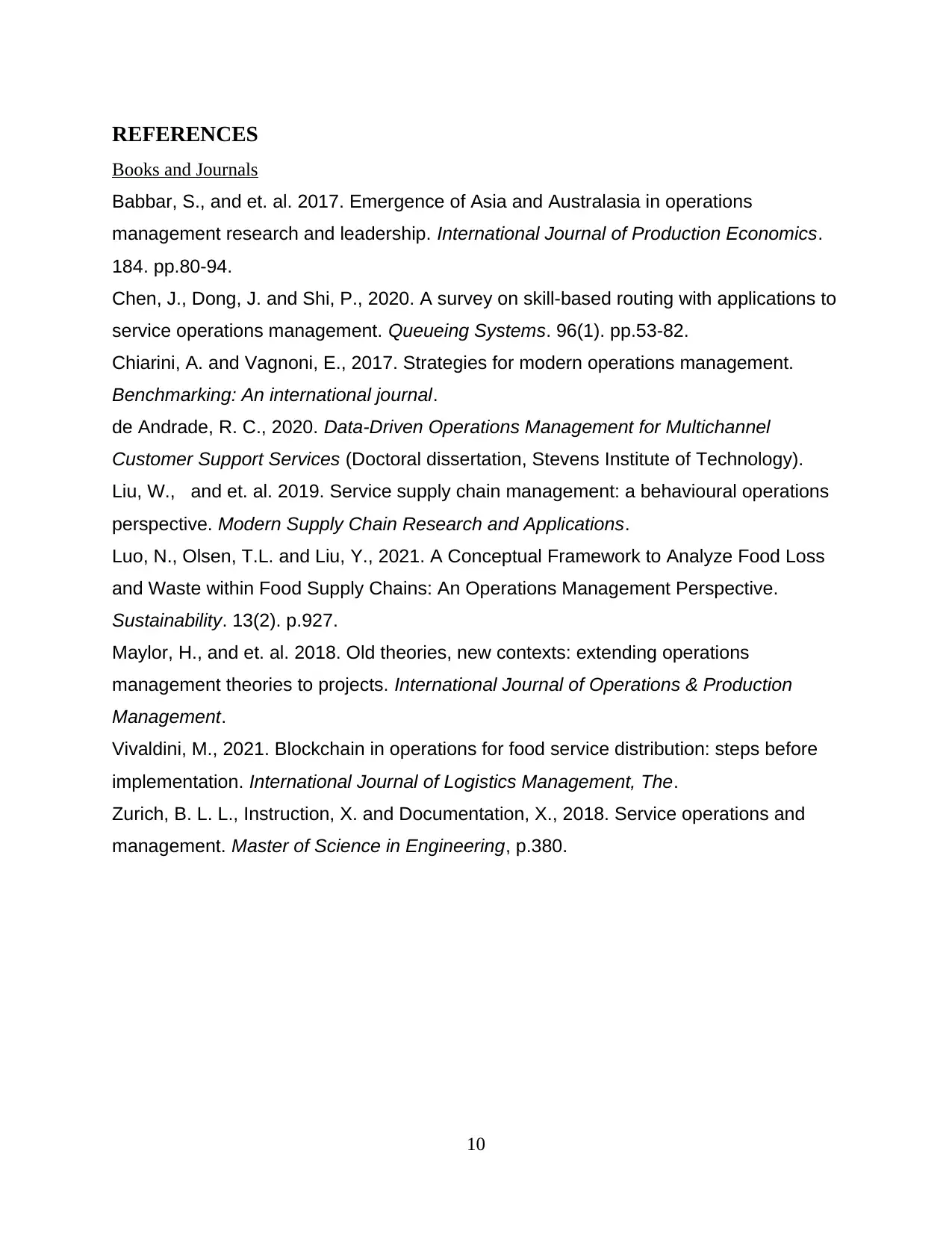
REFERENCES
Books and Journals
Babbar, S., and et. al. 2017. Emergence of Asia and Australasia in operations
management research and leadership. International Journal of Production Economics.
184. pp.80-94.
Chen, J., Dong, J. and Shi, P., 2020. A survey on skill-based routing with applications to
service operations management. Queueing Systems. 96(1). pp.53-82.
Chiarini, A. and Vagnoni, E., 2017. Strategies for modern operations management.
Benchmarking: An international journal.
de Andrade, R. C., 2020. Data-Driven Operations Management for Multichannel
Customer Support Services (Doctoral dissertation, Stevens Institute of Technology).
Liu, W., and et. al. 2019. Service supply chain management: a behavioural operations
perspective. Modern Supply Chain Research and Applications.
Luo, N., Olsen, T.L. and Liu, Y., 2021. A Conceptual Framework to Analyze Food Loss
and Waste within Food Supply Chains: An Operations Management Perspective.
Sustainability. 13(2). p.927.
Maylor, H., and et. al. 2018. Old theories, new contexts: extending operations
management theories to projects. International Journal of Operations & Production
Management.
Vivaldini, M., 2021. Blockchain in operations for food service distribution: steps before
implementation. International Journal of Logistics Management, The.
Zurich, B. L. L., Instruction, X. and Documentation, X., 2018. Service operations and
management. Master of Science in Engineering, p.380.
10
Books and Journals
Babbar, S., and et. al. 2017. Emergence of Asia and Australasia in operations
management research and leadership. International Journal of Production Economics.
184. pp.80-94.
Chen, J., Dong, J. and Shi, P., 2020. A survey on skill-based routing with applications to
service operations management. Queueing Systems. 96(1). pp.53-82.
Chiarini, A. and Vagnoni, E., 2017. Strategies for modern operations management.
Benchmarking: An international journal.
de Andrade, R. C., 2020. Data-Driven Operations Management for Multichannel
Customer Support Services (Doctoral dissertation, Stevens Institute of Technology).
Liu, W., and et. al. 2019. Service supply chain management: a behavioural operations
perspective. Modern Supply Chain Research and Applications.
Luo, N., Olsen, T.L. and Liu, Y., 2021. A Conceptual Framework to Analyze Food Loss
and Waste within Food Supply Chains: An Operations Management Perspective.
Sustainability. 13(2). p.927.
Maylor, H., and et. al. 2018. Old theories, new contexts: extending operations
management theories to projects. International Journal of Operations & Production
Management.
Vivaldini, M., 2021. Blockchain in operations for food service distribution: steps before
implementation. International Journal of Logistics Management, The.
Zurich, B. L. L., Instruction, X. and Documentation, X., 2018. Service operations and
management. Master of Science in Engineering, p.380.
10
⊘ This is a preview!⊘
Do you want full access?
Subscribe today to unlock all pages.

Trusted by 1+ million students worldwide
1 out of 12
Related Documents
Your All-in-One AI-Powered Toolkit for Academic Success.
+13062052269
info@desklib.com
Available 24*7 on WhatsApp / Email
![[object Object]](/_next/static/media/star-bottom.7253800d.svg)
Unlock your academic potential
Copyright © 2020–2026 A2Z Services. All Rights Reserved. Developed and managed by ZUCOL.





